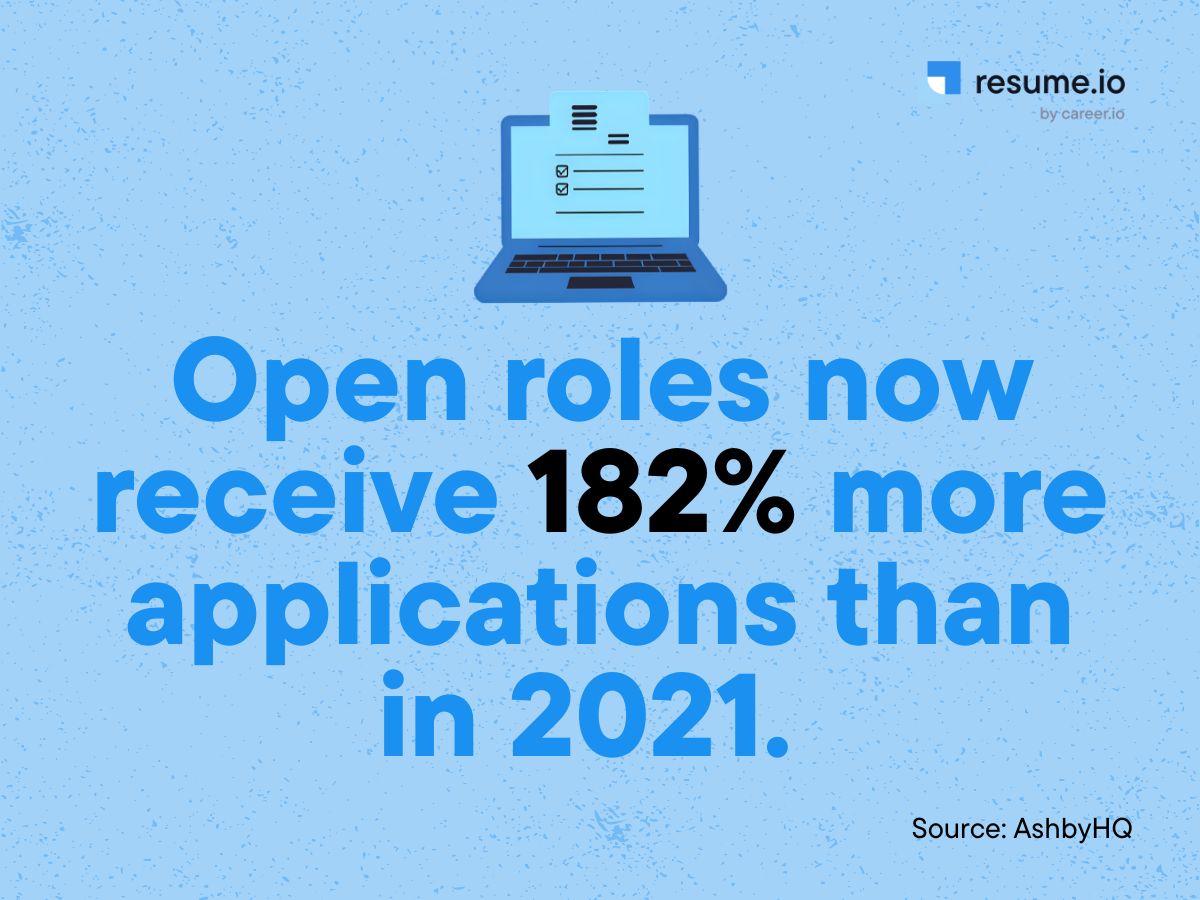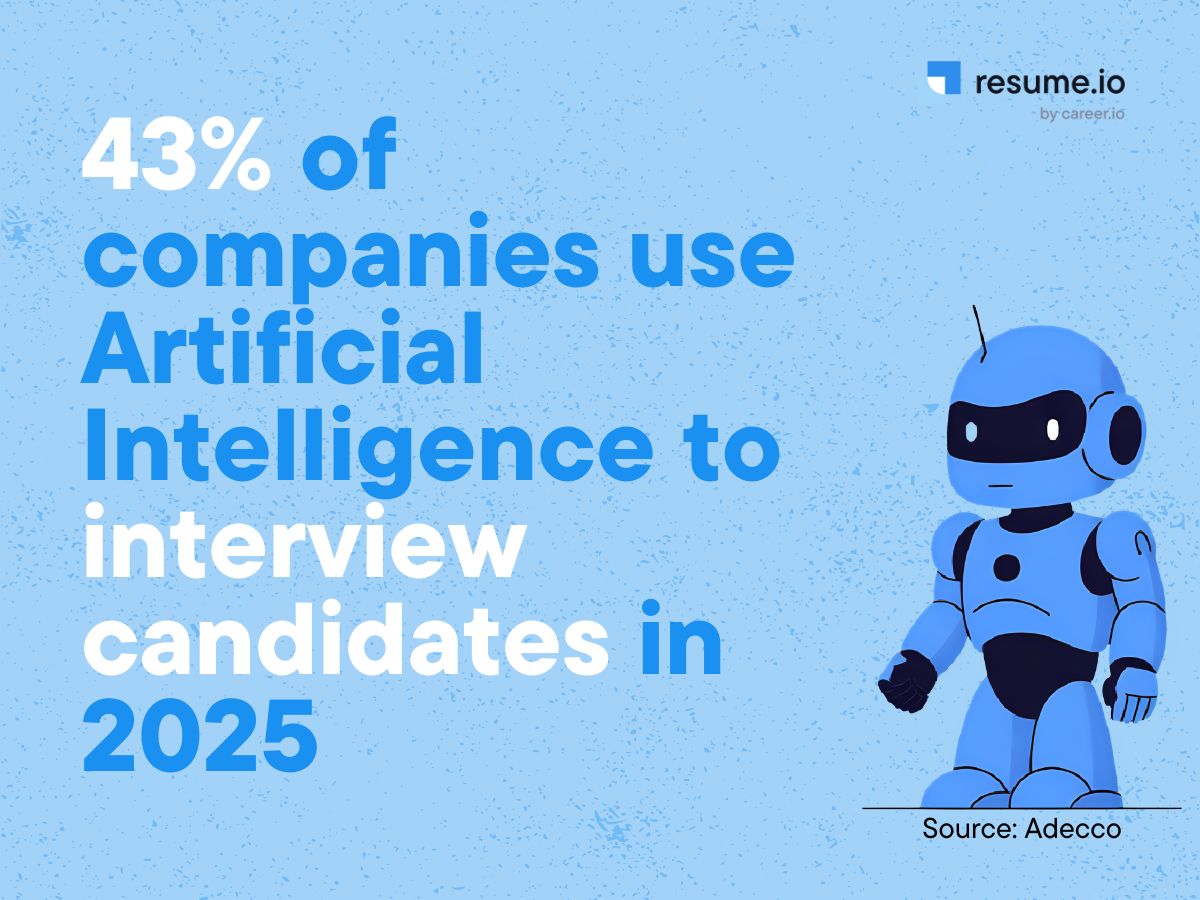These job interview statistics will help you make smarter preparation choices. The modern hiring landscape has transformed dramatically, making interview success more important than ever before.
This comprehensive guide presents 30+ essential job interview statistics that will shape your approach.
We've gathered these insights from numerous research studies and industry reports to provide you with a clear picture of what really happens during interviews. Given that most hiring decisions are influenced by factors beyond just qualifications, these statistics become your roadmap to success.
In this blog, we will look at the following statistics:
- The competitive landscape for a job interview
- How long does the job interview process last?
- The type of interview questions asked
- What happens after a job interview
Before an interview
How many people apply for a single job?
- On average, job postings receive about 250 resumes, of which only 4 to 6 result in interviews, highlighting the importance of knowing how to make your resume stand out. (Glassdoor)
- Only about 3% of applicants make it to an interview. (Team Stage)
- The number of Applications per Hire has increased by 182% since 2021. (AshbyHQ)
- 47% of job seekers get invited to 1-2 interviews after submitting up to 10 applications. (U.S Bureau of Labor Statistics)
- In 2025, job-seeking graduates receive 1-2 responses for every 10+ graduate jobs they apply for. (TopResume)

How long does the interview process take?
6. The average time from application to offer is approximately 27.5 days. (LinkedIn)
7. 69.5% of interviewers make their hiring decision within the first five minutes, while only 22% of hiring managers decide at the end of the interview. (The British Psychology Society)
How important is preparing for an interview?
8. 47% of candidates fail job interviews due to demonstrating a lack of knowledge about the company. (Time Doctor)
9. 48% of employers use social media to screen candidates during the hiring process, so conduct a thorough check before any interviews to ensure they’re set to private or SFW. A further 1 in 5 employers turn down candidates after reviewing their social media. (YouGov)
How much do Americans spend on interviewing?
10. The average US interviewee spends $72.29 per interview on travel costs, an hour of time from their salary, lunch and a post-interview coffee. (MoneyPenny)
What should you wear to a job interview?
11. 70% of hired candidates typically wear black clothing to job interviews (SmartRecruiters)
12. 37% of interviewers share that candidates should always wear formal wear when interviewing for a job, whereas 36% feel it should depend on the position you’re interviewing for. (Robert Half)
13. While appearance plays a key role, many companies are becoming more accepting of piercings and tattoos in a job interview setting, though it can still vary based on company culture (resume.io)
During the interview
What should you expect from interviews in 2025?
14. 70% of Americans prefer in-person interviews to virtual interviews (American Staffing Association)
15. 82% of employers use virtual interviews as part of their recruitment process (Indeed)
16. 43% of large companies use artificial intelligence to interview potential hires. (Adecco)

What questions are asked in job interviews?
17. 75% of U.S. interviewers say that behavioral questions are effective when evaluating a candidate’s potential performance. (LinkedIn)
18. 63% of organizations use hypothetical scenarios to evaluate a candidate’s problem-solving skills, so come armed with a few examples for your interview. (Zirtual)
19. “Tell me about yourself” is asked in 85% of interviews, so have a bio ready! (TheMuse)
Should you ask about salary in a job interview?
20. 44% of Gen Z workers say they’ve lost interest in a job when a salary range wasn’t mentioned during the interview process. (Monster)
21. 4 in 10 candidates say that offering an unfairly low salary is the most off-putting interview behaviour. (Paychex)
Post-interview
Why could you have been rejected for a job after an interview?
22. 47% of Gen Z workers admit to having lied in a job interview. (career.io)
23. 24% of candidates who lie in interviews do so to cover up large gaps in employment. (Statista)
24. 17.1% of hiring managers have rejected a candidate due to poor body language in an interview. (career.io)
25. Over 30% of interviewers highlight avoiding eye contact as a key reason for not making a hire. (Ringover)
26. 39% of job seekers leave a negative impression on interviewers due to a lack of confidence, poor voice quality, or absence of a smile (Jobspin).
27. 52% of job seekers in the US report being ghosted after an interview. (Greenhouse)
28. 71% of employers consider the appropriate dress code a critical factor while evaluating job candidates (Softspace)
29. The most common interview mistakes made by job applicants include not asking questions (38%), talking too much (33%) and appearing uninterested (32%). (CareerBuilder)
30. 68% of hiring managers say receiving a thank-you email influences their hiring decision, with almost 20% admitting they’d dropped a candidate for not sending one. (TopResume)
What happens after an offer is extended?
31. When given an offer of employment, candidates who accept an offer do so within two days, whereas candidates who are going to reject typically take six days to get back to a hiring manager. (AshbyHQ)
32. Nearly 96% of candidates accept the first offer extended to them, highlighting the importance of informing successful candidates when companies have made a decision. (Field of Talent)
33. Almost 25% of job seekers retract accepted offers after accepting them verbally. (iHire)
Tips for interview success
While it’s tempting to view interviews as something to “ace,” real success comes from showing up prepared, relevant, and intentional. Interviewers often have limited time and high expectations, so it’s less about performance and more about clarity, alignment, and confidence.
Here are some key ways to set yourself apart in an interview:
- Do your research: Know the company, the role, and the industry. It shows genuine interest and helps you speak to what actually matters in the conversation.
- Be specific: Use real examples to highlight your experience. Focus on outcomes, not just responsibilities. Numbers help — so do clear takeaways.
- Practice, but don’t script: Rehearsing key points is smart. Reciting answers word for word? Less so. Aim for structure, not memorization.
- Ask thoughtful questions: Good questions show you’re not just there to talk about yourself. They signal curiosity and a serious approach to evaluating the opportunity.
- Keep it concise: Long-winded responses risk losing momentum. Know your key points, and stay on track.
- Show confident body language: Eye contact, posture, and energy matter. They help build trust before a single word is spoken.
- Tailor your responses: Use the job description as your north star. Speak directly to the skills and qualities they’re actually looking for.
- Speak plainly: Industry knowledge is helpful, but overloading with jargon or buzzwords can backfire.
- Know your “why”: Be ready to talk about what you’re looking for; and why this role fits into that vision.
- Get the basics right: Be on time, dress appropriately and test your tech. These may seem small, but they’re non-negotiable for a good first impression.
Interviewing well isn’t about performing. It’s about preparation, alignment, and showing who you are in a way that resonates with what they need.
- Glassdoor
- TeamStage
- AshbyHQ
- BLS
- TopResume
- British Psychological Society
- YouGov
- MoneyPenny
- SmartRecruiters
- RobertHalf
- American Staffing Association
- Indeed Hiring Trends Report
- Adecco
- The Muse
- Monster
- Paychex
- career.io
- Statista
- BenefitsPRO
- Greenhouse Software
- Softspace
- CareerBuilder
- TopResume
- Field of Talent
- iHire





